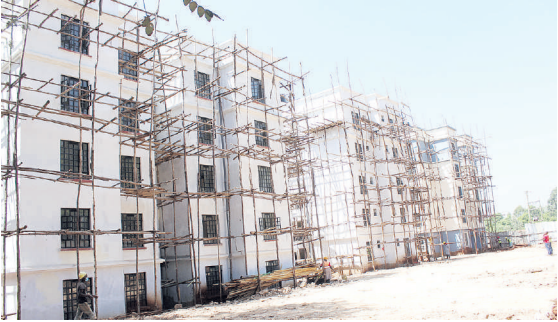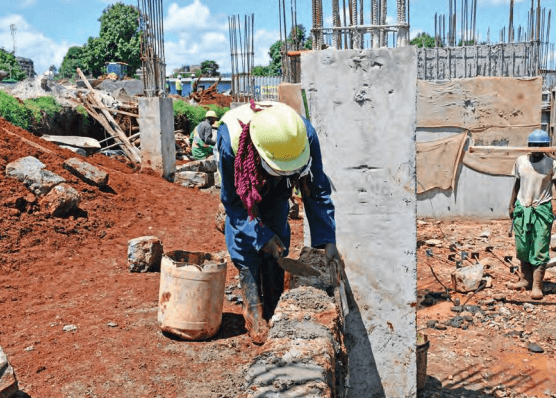
When the government announced it would construct affordable housing to uplift the economy, many Kenyans dismissed the idea, saying they were not needed.
At that time, Kelvin Kariuki, 26, was a casual worker at construction sites in Murang’a county.
The affordable housing project prompted him to use his savings to join Kandara Technical and Vocational College, where he studied plumbing.
“I realised the field was very marketable and would earn me good money daily. Since I already had some experience, it was not hard to take the course,” he told the Star.
When he completed the course in 2023, the government had started the housing project. In Kandara, the government started the Sh490 million project in Makenji next to Thika-Kenol highway in November 2023.
By then, Kariuki was getting scattered contracts in building projects and he walked into the Makenji project office one day and asked for a job.
The contractor was hiring workers and Kariuki got a job. Earning Sh800 per day, Kariuki said he has started income-generating projects at home.
“I have been earning Sh800 consistently for over one year,” he said.
“That’s a lot of money and it has enabled me to start poultry keeping and support my parents. When it’s over, I will have gained a lot of experience.”
“This project has changed my life. I no longer need to worry about looking for more projects to earn a living. I wake up every day certain my job is there until the project is over.”
Teresiah Kyalye is one of the 200 youths engaged in the Makenji project. She is a housekeeper. She had studied human resource management in college but could not find a job.
“People were being sacked from organisations while I was looking for a job,” Kyalye said.
“It was very hard and I was very happy to get this one in August last year. When I got it, I did not even consider the course I had undertaken. I didn’t have the luxury of choice.”
Michael Mwololo, the project’s clerk of works, said many local youths who had been abusing alcohol and engaging in antisocial activities, have reformed after being hired.
“The high crime rate previously reported has declined,” he said. “We have also provided internships to many local youths graduating from TVETS.”
The project, which is 50 per cent complete, will have 220 units, including 60 three-bedroom units, 100 two-bedroom units and 60 studios.
Site agent Peter Kilonzi said at first, the contractor, Fred Engineering Services, faced serious challenges before the community accepted the project.
This opposition was worsened by the flattening of two churches that had been established on five acres meant for the project.
They were allocated other land. It took the intervention of local leaders who sensitised the community on the benefits of the project.
Before the project started, many young people were stealing pineapples from Del Monte farm and hawking along the highway.
“All that has changed since we started the project. Muggings have also stopped because many youths are now earning a decent living,” Kilonzi said.
He said the project will be completed in April. The contractor has also engaged local welders and carpenters to make doors and windows through their associations.
For 53-year-old mason John Kaniaru, the project has provided a steady income to educate his eight children, some of whom are in university.
He takes home Sh1,200 daily and has started a poultry and goats keeping project at his home in Ithanga.
“I was idle for some time before this project started and with such a big family, it’s a strain you if no money is incoming”.
Anne Wanjiku, 62, said Makenji area was a hotspot for robberies and insecurity as residents struggled to make a living.
Wanjiku, who sells porridge, snacks and fruits to construction workers, said the project has been of great benefit to the community.
“I have been selling porridge since 2002 but my fortunes have turned since this project started,” she said. “Every week, the workers pay me about Sh7,000 and that’s on top of the money I make selling porridge in the town.”
The money helps her raise her three grandchildren. She was left in charge of her grandchildren after her daughter disappeared without a trace more than a decade ago.
When the houses are occupied, she will open a stall in the shopping centre to sell porridge to the increased population.
In Kianyaga, Kirinyaga county, the government is also establishing 110 units including 40 three-bedroom units, 40 two-bedroom units and 30 studios.
The Sh271 million project is 87 per cent complete, clerk of works Victor Kimathi said. It will be handed over to the government by Belfast Engineering Works Company in mid-February.
Kimathi said the project started in October 2023 and employs about 150 youths daily. “Putting money in the pockets of all these youths has changed the town and impacted their families positively,” he said.
Contractor Samuel Wambugu said tales of alcoholism and drugs in the area had made him apprehensive when he started working on the project.
But when the project took off,
hordes of youths would turn up
looking for work, many often being
turned away due to the high number. Wambugu would often buy
them lunch.















